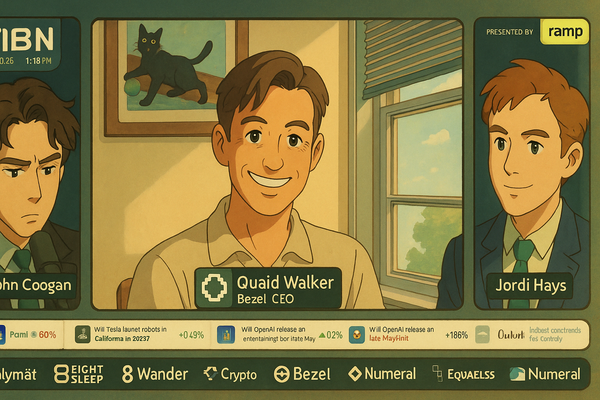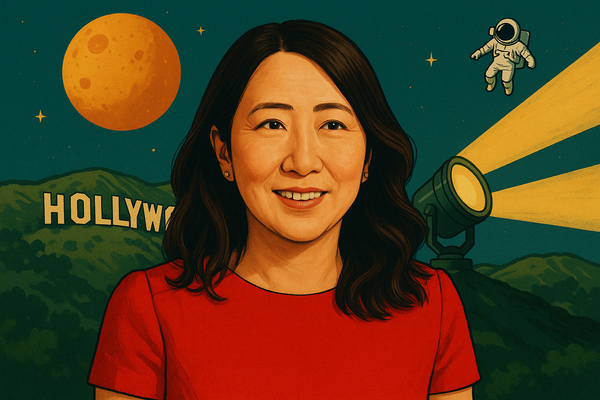Elon Musk is on Nick Denton’s mind
Trading on narratives

I’m on my way to the SABEW conference in Arlington, Virginia, to discuss how journalists are forging an independent path on Substack and beyond. Let me know if you’ll be at the event.
Today, I have a member essay I wrote based on a conversation I had with Nick Denton yesterday for an episode of People vs Algorithms that will be out tomorrow morning. Nick's newfound identity as a “head of macro” says a lot of about the current media moment, when narratives and memes are all powerful and rarely driven by institutional media.
Reminder: Upgrade to TRB Pro for full access to all of The Rebooting’s content, as well as invitations to events like our upcoming Media Product Forum and Cannes program. Upgrade to TRB Pro.

As traffic from search and social becomes less reliable, publishers are rethinking how they build lasting relationships with readers. In this Online Forum, we will take a deep dive with Metro UK and Marigold into how Metro is using personalization to deepen engagement and boost conversions through email.
We’ll break down how Metro built high-performing, personalized newsletter products — including a horoscopes email — and what it took to operationalize segmentation at scale. Learn how they’re using dynamic content, preference-based onboarding, and first-party data to improve performance and build loyalty.
Join us on April 23 to hear how a major publisher is solving for post-platform distribution challenges and why interest-based personalization is proving more durable than chasing algorithms
Elon Musk is on Nick Denton’s mind
Nick Denton continually comes back to the world’s richest person during a conversation we had with Troy Young on a new episode of People vs Algorithms. He mentioned Elon Musk 19 times, in fact.
Nick knows a good story. Musk is a billionaire child king living out his own comic book fantasy. He has Main Character energy in a larger story that is well beyond the type of cultural ephemera of early Gawker like the politics of the Condé Nast cafeteria.
This story is about how the future of the world is shaped. It will not be shaped in the Condé canteen. Trillions of dollars are at stake in a historic transition that’s beyond even the fall of communism, which he covered as a Financial Times journalist in Eastern Europe.
This is the story of the American empire giving way to a new world where American hegemony is rivaled, and often exceeded, by Chinese power in the commanding heights of the future like AI and energy production.
“It’s the best story I’ve ever seen,” he said. “Bar none. No question.”
He doesn't want to tell that story. He wants to trade on it.
Nick Denton knows narratives. He was a defining figure in the last era of digital media, growing Gawker Media from a scrappy blog empire into a cultural force —and the envy of more than a few legacy media executives.
That is, of course, until Gawker’s transgressive edge veered into nihilism and led to its elimination at the hands of a vengeful billionaire. It was another good story. But he’s seemingly moved on from all of that. If there’s any lingering resentment, it’s not directed at Peter Thiel – Nick seems to admire him more than cast him as a villain – but to the Gawker editorial staff that embarked on what he calls a “political jihad” that brought down the overall company. Gizmodo, Lifehacker and Kotaku died for Gawker's sins.
“I did fire half the staff in 2015 and bring it to heel then, but I hadn’t shut it down,” he said with a healthy dose of 20/20 hindsight.
Looking back now, he says Peter Thiel did him a favor. The $140 million judgment that bankrupted Gawker also gave him a clean exit—a forced off-ramp from a company with a flagship brand that he admits had slipped out of his control. It was also a great narrative ending to meet a tragic end rather than be sent to the SEO glue factory.
“I was relieved when Gawker.com was shut,” he said. “It was time. I wasn’t able to do it myself. I probably should have shut it down just for sheer business reasons.”
These days he’s more focused on battery production statistics in China and psychological profiling of Musk than media industry gossip. He’s leaving his loft across from Balthazar to live the émigrée life in Budapest. He might even open a cafe and become a guy who does “this and that.”
A mostly forgotten aspect to the Gawker story is when he decamped to Silicon Valley in 2007 for eight months to write Valleywag, the Gawker equivalent for a tech industry that was more in transitions from lovable geeks in a garage narrative to civilization-conquering oligarchy. He was in the information bazaar with the men who would make up the broligarchy. Make no mistake: They cared deeply about media.
“Without wanting to boast too much, when I did it, it was on everybody’s screen. Andreessen, Musk—the whole damn cast of characters—all writing in with their tips and their arguments and their grievances.”
This kind of information and gossip peddling is the fuel for all power industries. Gawker’s conceit was that the conversations journalists had at the bar was always more interesting than their massaged and careful copy. In the Information Space, the narrative energy has shifted from the professional media industry to individual voices and the “man in the arena” crowd. The fundamentals aren’t different.
“You put out information in order to get information. That’s what journalists have always done. I don’t understand why we’ve made it more complicated than it needs to be. The skills are the same—it’s just a better payoff structure.”
One thing that doesn't interest him as much as Chinese electrical capacity: the state of the media business. “I don’t think about the media industry that much," he said. "I don’t track it.” Is Substack the successor to blogs? Hasn't given it much thought. Why is the right so prominent in alternative media? Simple: the left is boring.
“I haven’t found anything the left has said interesting in several decades,” he told us, dismissing their recent intellectual energy as too little, too late. He praised figures like Matt Yglesias for pushing the abundance and YIMBY memes but waved off broader left-leaning media as irrelevant to the current moment. It’s not that their ideas are wrong — “after 30 years, they wake up and say, maybe housing is an issue” — it’s that they’re reactive. They’re responding to narratives, not making them.
The best story of our time in his telling is the MAGA rampage that is upending American policy and status in the world, a decoupling from globalization, and the emerging economic and technological dominance of China, particularly in AI, energy, and manufacturing. He's touting his short positions in Tesla, his long positions in a raft of Chinese companies like BYD, Tencent and Xiaomi. He's bought gold.
"There’s trillions of dollars at stake. There are empires at stake. There is a new era coming and it’s all going to play out right in front of us."
I kept wanting to steer the conversation back to the media business, but it was clear that he was if not over it, at least over it as a business. He said one of his darkest moments at Gawker was signing a deal to put a content recommendation ad network – he can't remember which one – on its pages.
“Those guys revolted me—and I revolted myself for putting that junk on the page,” he said. “When we had plenty of interesting discussions to put up there.”
I got the sense he finds the media business uninteresting and possibly a squandering of human capital. After all, journalism is filled with very smart people with amazing instincts. Those are broadly the same core skills as financiers like Bill Ackman and Ray Dalio. Unearthing information and connecting the dots are a media function, only they're far better in service of trading options than in attracting eyeballs to arbitrage to ad networks. Why publish information when you can trade on it?
“You put out information in order to get information,” he said. “That’s what journalists have always done. I don’t understand why we’ve made it more complicated than it needs to be. The skills are the same—it’s just a better payoff structure.”
The conversation reinforced a core belief I have: This is both a golden era for media and an extinction-level event for the media business. They are different things. Narratives are more powerful than ever. They’re more likely to be shaped on X than in traditional media. Denton reads individuals, not institutions. He reads Janan Ganesh rather than the FT.
The power of prediction markets like Polymarket intrigue Nick. They're information bazaars to stress test narratives. His new venture, Futura Kiado, uses AI-enabled narrative modeling and scenario simulations to find leverage in trading.
The premise is that narratives are at the heart of this story of the century, which is chaotically and unpredictably unfolding. When Trump talks tarrifs from the Rose Garden, the feedback loop of the stock market is side by side, passing judgment on his narrative.
JD Vance has created a meme of Europe as freeloaders. Tesla is a meme stock. The dollar is a meme currency backed by little more than the narrative of American power. America itself, he told us, is a meme nation—its strength maintained not just by economics or military force, but by the story it tells the world and itself. In his view, all these stories are losing their resonance as new narratives and memes take their place.
Think of how Ezra Klein and Derek Thompson have injected the "abundance" meme into the Information Space and put themselves at the center of recasting the Democratic Party. The degrowth meme has been mostly abandoned. Denton is a spreader of the "China will win" meme, along with fellow travelers like Balaji Srinivasan, Ray Dalio, and Matt Yglesias—each from wildly different ideological corners, but aligned in their early adoption of this narrative shift.
Seen this way, Nick's reemergence is part of his trading strategy. The media layer that sits on top of his bets. It's far better alignment than crafting media to grab attention in the service of ad impressions.
In the Information Space, of course you are talking your own book because everyone is talking their books, all the time. In this lens, All-In makes a lot more sense.
He isn’t shorting Tesla because of its balance sheets per se. He’s shorting the Tesla narrative. He sees belief collapsing, even if the Cybertruck is pretty cool. And belief, in this framework, is the most valuable commodity. Tesla is a story. America is a story. The next great fortune won’t come from publishing a scoop that will make Chartbeat go brrr. It’ll come from being early to a story that moves markets.
“There’s no real difference between media and investing,” Denton told us. “If you understand how stories move people, you understand how they move markets.”
Thanks for reading and being a TRB Pro member. Send me a note with feedback by replying.




